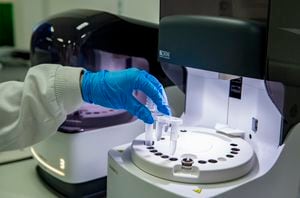New mutant Covid strain has been in West Midlands for weeks, analysis shows
Around one in 10 recent coronavirus cases in the West Midlands have been caused by the new strain of Covid, analysis of official figures suggests.

Data from the national coronavirus infection survey shows the mutant strain has been in the West Midlands for at least one month and that 11 per cent of cases in the region for the week starting December 9 were the new strain.
This is compared to the new strain being identified in 62 per cent of cases in London and 43 per cent of cases in the South East for the same period.
Both of these areas have been put into new Tier 4 restrictions as a result of the fast-spreading new strain.
There are no figures available by local authority area, with the West Midlands area including all of Birmingham and the Black Country (Tier 3) as well as Shropshire and Telford and Wrekin (Tier 2).
Figures by region:
For the week beginning December 9.
Cases of the new mutant strain, as a percentage of overall coronavirus cases, according to analysis of ONS figures.
The figure in brackets is the equivalent number for the week beginning November 18.
London: 62 per cent (up from 28 per cent)
East of England: 59 per cent (up from 23 per cent)
South East: 43 per cent (up from 28 per cent)
South West: 27 per cent (up from 13 per cent)
North West: 17 per cent (up from five per cent)
East Midlands: 16 per cent (up from seven per cent)
North East: 15 per cent (up from seven per cent)
West Midlands: 11 per cent (up from seven per cent)
Yorkshire and the Humber: five per cent (down from eight per cent)
Figures by country:
England: 36 per cent (up from 13 per cent).
Wales: 28 per cent (up from 15 per cent)
Northern Ireland: 17 per cent (down from 18 per cent)
Scotland: 14 per cent (up from 10 per cent)
Travel from London, South East and Wales to other parts of the country is banned under the new rules, and public health bosses in the West Midlands have urged anyone who has travelled from a Tier 4 area to the region to self-isolate for 10 days regardless of whether of not they have tested negative.
Boris Johnson has said the new variant could be up to 70 per cent more transmissable than the original Covid-19 strain, and countries across Europe have banned people from travelling from the UK as a result.
Cases of the new variant have been reported in Iceland, Denmark, the Netherlands, Gibraltar and Australia.
The strain was first identified in October, from a sample taken in September, but it was not until Friday that its higher transmissibility was confirmed.
More Covid-19 coverage:
Analysis by Professor Sarah Walker, from the University of Oxford, suggests the prevalence of the new strain remains low in the West Midlands compared to London, the South East and Wales.
Seven per cent of cases in the West Midlands were the new strain in the week starting November 18, 10 per cent were in the following week, then 13 per cent in the week from December 2 and 11 per cent in the week beginning December 9.
In the same period the proportion of cases caused by the new strain went from 28 to 62 per cent in London and 15 to 28 per cent in Wales.
Prime Minister Boris Johnson told a Downing Street briefing that early analysis showed the new strain could increase the reproductive rate by 0.4 or more.
However no laboratory studies of the transmissibility have been completed.
Public Health England said that, as of December 13, 1,108 cases with this new variant had been identified, predominantly in the south and east of England.
It has been named VUI-202012/01, the first variant under investigation in December.
Calum Semple, professor of outbreak medicine at the University of Liverpool and a member of the Scientific Advisory Group for Emergencies (Sage), said the new strain is likely to become the dominant global strain of Covid-19.
Prof Semple said it was too early to be sure how a vaccine will behave with the new strain, but scientists are racing to confirm that the effectiveness of the vaccine will not be affected.





